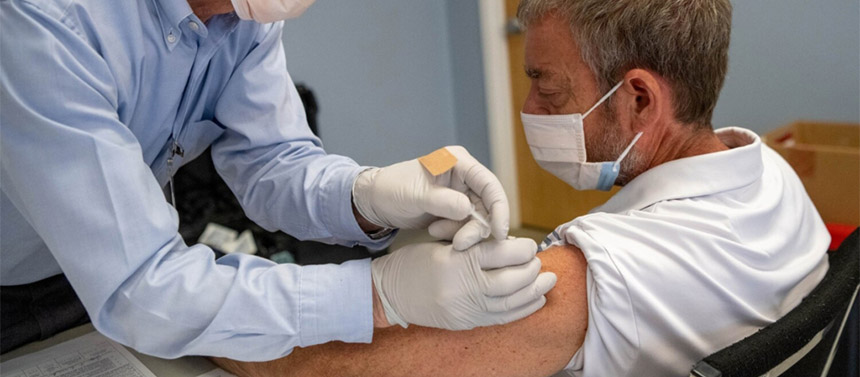
They’ve been put to the test by duly skeptical scientists, and the findings are unmistakable: They save lives.
Vaccines are among the most beneficial and humane public health innovations in human history. I support Gov. Mills’ recent health worker vaccine mandate (or one like California’s, which offers frequent testing as an option) because ensuring that public places – especially health care settings – are as free from COVID transmission as possible will help reduce suffering and economic impacts caused by this evolving, awful pandemic.
Hesitancy about vaccination has huge implications for everyone. It’s important, therefore, to respect that there are various reasons many Mainers have not received one of the freely available vaccines. Sometimes they have more than one reason.
• A small number of people may never believe that vaccines save lives and have excellent safety records (a refutation of verifiable evidence).
• Others have avoided vaccination because they oppose mandates or even recommendations about anything (a matter of authority and autonomy); often this is blended with entrenched fears about a controlling and sinister entity, such as corporations or the government. The U.S. Supreme Court has held since the 1905 Jacobson decision that the government can compel individuals to get vaccinated. When the Food and Drug Administration grants final (non-emergency) authorization of a COVID vaccine, I expect this aspect will be more widely discussed.
• A large and important group of vaccine-hesitant people includes folks who simply aren’t sure if the benefits exceed the risks (a matter of uncertainty and discomfort). It’s perhaps the most influential segment of the population, whose actions may grant the virus too many further opportunities to propagate mutations, and ultimately determine the duration and carnage of this pandemic. These vaccine skeptics are like swing voters in an election.
A measure of skepticism is natural and, in fact, implicit in the “scientific method,” the structured approach to understanding our natural world. The scientific method has enabled the discovery or invention of so much that we take for granted: e.g., the roundness of the planet; electric lighting; automobiles; weather forecasts; smartphones and other computer technology; prescription medicines, and some low-tech interventions that reduce suffering and mortality rates every single day.
For instance, in the mid-1800s, we did not yet know that bacteria, viruses, fungi and protists can cause disease. A Hungarian physician, Ignaz Semmelweis, proposed that if doctors who attended childbirths scrupulously washed their hands before caring for their patients, far fewer newborns and mothers would die of what was then called “childbed fever.” This was out-of-the-box thinking at the time, for which he was harshly ridiculed for the rest of his tragically short life. But Semmelweis had done the work to test his thinking and share his results. When others replicated his work in different populations and circumstances, they kept finding that hand-washing saves lives. Even though Louis Pasteur and Robert Koch hadn’t yet explained to the world why hand-washing saves lives, the findings were unmistakable. Semmelweis’ once-radical idea eventually became recognized as fact. Ignoring it would mean infants and mothers would needlessly die. Getting to that safer place involved careful testing, not just supposing and guessing.
With COVID vaccines, we’re not guessing about safety and effectiveness. Just as others put Semmelweis’ idea to the test, scientists have subjected COVID vaccines to many studies among properly and ethically consenting individuals (quite unlike Nazi researchers, contrary to what a fellow legislator recently stated). They have been proven over and over again to be highly effective and safe (scroll down here for a couple dozen such reliable studies). Furthermore, studies continue to refine our knowledge, and supersensitive reporting methods monitor for safety.
Before training to be a physician, I served aboard Navy ships, from the smallest (submarine) to the largest (aircraft carrier). So when I think about community health or other public issues, being “in the same boat” is both figurative and literal. Part of what kept us alive aboard ships and what enabled us to accomplish our missions was a shared awareness that one person’s actions could and often did have tremendous implications for everyone. The danger of politicizing public health, to me, is the same as politicizing navigation and engineering at sea. It just doesn’t make sense to completely disregard what shipmates who are experts in their areas are saying about what they’re observing. Ignoring verifiable facts is a recipe for disaster.
Zager, S. (2021) ‘Maine Voices: We’re not guessing about safety, effectiveness of COVID vaccines’, Portland Press Herald, August 22. Available at https://www.pressherald.com/2020/05/13/letter-to-the-editor-inspiring-hardworking-zager-a-good-choice-for-district-41/ (Accessed: January 5 2022)
Photo credit: Michael G. Seamans/Morning Sentinel

